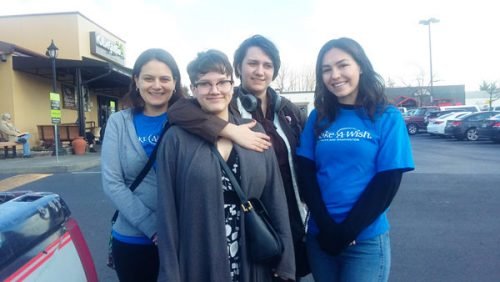 Make-A-Wish volunteers with Jillian and best friend Angel Reeves celebrate. From left to right, Isabel Echevarria, Jillian, Angel, Claire Goveia. Photo: Trina Flaherty
Make-A-Wish volunteers with Jillian and best friend Angel Reeves celebrate. From left to right, Isabel Echevarria, Jillian, Angel, Claire Goveia. Photo: Trina Flaherty
Bone marrow transplant in 2017 leads to recovery from fatal bone marrow disease.
Make-A-Wish volunteers Claire Goveia and Isabel Echevarria met Jillian Reese, 17, when she was hospitalized last year and were delighted to see her in good health March 9 to present her with her wish—an Xbox, a monitor and a gaming chair—over lunch at Tacoma’s Olive Garden. Jillian’s mother, Trina Flaherty, and best friend Angel Reeves were there to help celebrate.
Following a serious viral infection when she was 4 years old, Jillian had suffered from a low platelet count, which put her at risk for bleeding. By the time she was 16 the problem had progressed to pancytopenia; in addition to not making platelets, her bone marrow was no longer producing red blood cells to carry oxygen or white blood cells to protect from infections. Without treatment the condition would be fatal (see “KP Cares Supports a Family in Need,” KP News, June 2017).
The required treatment, a bone marrow transplant, was completed in August 2017 at Seattle Children’s Hospital. Jillian’s recovery was faster than expected, but still required a hospital stay of two months—one month in preparation for the procedure and one for recovery. After leaving the hospital, she lived in housing provided by Seattle Cancer Care Alliance for three additional months of close follow-up. She finally returned home Dec 1.
“There was still close follow-up, but it was wonderful to sleep in our own beds,” Flaherty said. Because Jillian was on immunosuppressant medications to make sure the donor marrow didn’t have to compete with Jillian’s own cells, Flaherty said they had to “live like hermits,” with limited contact with the outside world, careful attention to all food preparation, and using bleach to wash the dishes. In June the immunosuppressants were discontinued and life has been back to near normal.
“It’s like having a little kid again,” Flaherty said. “From the time she was four there were so many things she wasn’t allowed to do, so she wants to do everything—things as simple as roller skating. She has a good life now.”
There are still frequent follow-up visits to ensure the transplant is a full success, but if she continues to do well, in September Jillian will have follow-up just once a year; at the five-year mark she won’t need to be seen by SCCA at all.
Jillian has been keeping up with school work through online resources. In the fall, once her immunizations are up to date (she had to start that process from scratch following the transplant) she plans to return to Peninsula High School.
Jillian was referred to Make-a-Wish when she was at Children’s Hospital. Make-a-Wish was founded in the 1980s with the vision to grant the wish of every child diagnosed with a critical illness. It now has local chapters across the country. According to the website, wishes fall into five categories: to go, to meet, to be, to have, and to give. Jillian initially thought about taking a trip of a lifetime, but for various reasons her destinations weren’t feasible, and so she ultimately decided that a gaming system was what she really wanted.
As Flaherty thought about the last year and a half, she had a few thoughts to share. First, she extended her thanks to the Key Peninsula community and to KP Cares in particular. “Without their help we would not have had a home to come back to,” she said. She is looking forward to returning to work, but the logistics of Jillian’s illness and recovery were a full-time job.
And then, she added, “I encourage everyone to get on the bone marrow donor registry. A stranger from Oregon was a match for Jillian, and she saved Jillian’s life.” The family plans to meet with her to give their thanks in person once Jillian passes her two-year anniversary.
The National Marrow Donor Program welcomes donors between the ages of 18 and 44.
The first step is to join the registry online at bethematch.org.
Once you join you will be included in patient searches each day. If you are a match you will be contacted to confirm that you are willing to donate, asked to update your health information and participate in additional match testing. You will then be contacted to participate in an information session, have a physical exam and give blood samples.
Donation is usually through a non-surgical procedure called PBSC (peripheral blood stem cell) donation. Blood is removed through a needle in one arm and passed through a machine that separates out blood-forming cells. The remaining blood is returned into the other arm.
UNDERWRITTEN BY THE FUND FOR NONPROFIT NEWS (NEWSMATCH) AT THE MIAMI FOUNDATION, THE ANGEL GUILD, ADVERTISERS, DONORS AND PEOPLE WHO SUPPORT INDEPENDENT, NONPROFIT LOCAL NEWS